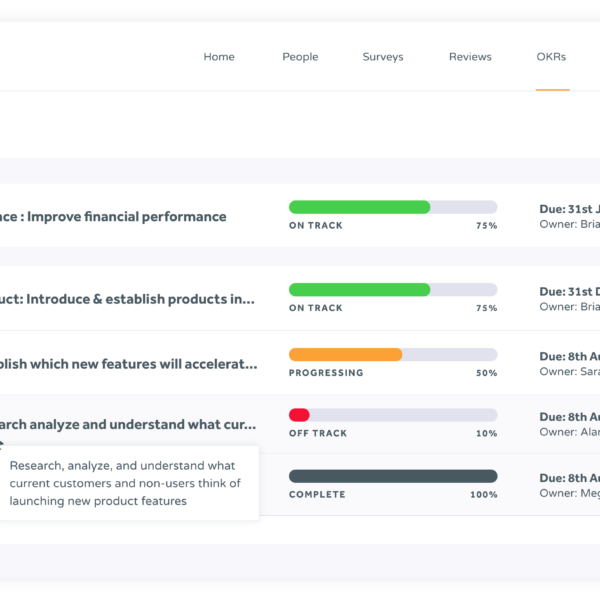Performance management is a critical aspect of organisational success, aiming to align individual and team goals with overall objectives while fostering growth, accountability, and employee development. However, many companies face challenges in implementing effective performance management systems that deliver true value. This blog explores the common pitfalls associated with performance management and the long-term impact they can have on your organisation.
The Illusion of Adequacy
One of the common issues in performance management is the illusion of adequacy. Many organisations admit that their performance management process is minimal or doesn’t even exist at all. This often occurs when organisations treat performance management as a box-ticking exercise, devoid of substantial value. When the process lacks depth and fails to provide meaningful feedback and support, it becomes difficult to identify any immediate negative consequences.
This illusion of adequacy creates a false sense of security, making it appear as though everything is functioning smoothly. Short-term observations may suggest that performance management has little impact on daily operations or outcomes. However, this misconception masks the potential long-term repercussions that can arise when performance management is neglected.
Short-Term Resilience
Due to the lack of a robust performance management system, companies may experience short-term stability. In the absence of visible, tangible impacts associated directly with performance management, teams may assume that everything is fine. However, this short-term resilience can be deceptive, as it fails to account for the long-tail effects that emerge over time.
Without proper performance management practices, organisations may overlook underlying issues that, although not immediately visible, gradually erode employee morale and performance levels. The absence of a well-defined performance management system can lead to complacency, hinder growth and stifle innovation within your workforce.
Unveiling the Long Tail

The long-tail effects of poor performance management create a ripple effect within your organisation. Reduced morale can result in decreased employee engagement, leading to a decline in overall productivity and team cohesion. Furthermore, the lack of a robust performance management system leaves room for biased decision-making, potentially resulting in unjust performance improvement plans or dismissals based on incomplete or inaccurate performance evaluations. These consequences can significantly undermine the overall productivity and culture of the organisation.
Leadership Awakening
As the negative consequences of poor performance management become more evident, organisational leaders question the underlying causes and dig deeper to identify the cause. This results in many realising that deficiencies in their performance management system are directly responsible for the issues their people are facing, including drops in morale, performance, and unfair dismissals. In recent years, this awakening has prompted many leaders to recognise the importance of implementing effective performance management practices and investing in the development of a robust framework.
Leadership’s understanding of the detrimental impact of flawed performance management is a crucial turning point. It signifies the acknowledgement that performance management is not just a bureaucratic process but a strategic tool for driving organisational success. With this awareness, leaders and HR can make informed decisions to rectify the shortcomings in the existing performance management system and implement improvements that foster a positive and supportive work environment.
The Dilemma: To Do or Not to Do
However, organisations find themselves caught in a challenging dilemma. While many acknowledge that the current state of performance management is flawed and can damage productivity and employee engagement, they also realise that completely abandoning performance management is not a viable option. Without any form of performance management, organisations risk losing sight of individual and team objectives, compromising accountability, and hindering growth and development opportunities.
The solution lies in transforming performance management from a box-ticking exercise into a meaningful and high-impact process. Organisations must recognise the need to invest in comprehensive performance management practices that align with their strategic goals and fosters employee growth, engagement and development.
To overcome the challenges associated with performance management, organisations can consider the following steps:
- OKRs and clear goal setting: Establish clear objectives that everyone in the organisation should be working towards. Set measurable and attainable goals for individuals that align with the organisation’s overall objectives. This ensures that employees understand their roles and expectations, fostering a sense of purpose and direction.
- Ongoing feedback and coaching: Implement a culture of continuous feedback and development with 1:1s. Encourage regular quality conversations between managers and employees to provide constructive feedback and address concerns. Identify areas for improvement using performance reviews and Intelligendas®️. This approach promotes employee development and helps address performance issues before they escalate.
- Development opportunities: Provide employees with ample opportunities for learning and development. This can include targeted training programs, mentoring initiatives, or job rotations that enhance skills, boost engagement, and increase job satisfaction. Identify exactly what development opportunities your people need using an intelligent engagement survey.
- Performance recognition: Establish a robust system for recognising and rewarding exceptional performance. Celebrating achievements not only motivates individuals but also reinforces a culture of excellence and encourages others to strive for success. WeThrive clients can send Hi-Thrives to thank their colleagues for a job well done.
- Performance evaluation: Conduct regular and fair performance evaluations that consider both qualitative and quantitative aspects of an employee’s contribution. Use WeThrive’s bank of best practice questions to gather unbiased feedback.
- Managerial accountability: Hold managers accountable for effective performance management. Provide training and support to help them understand their role in driving performance, providing feedback, and developing their teams. Managers should be equipped with the skills and tools necessary to lead their teams effectively.
- Continuous improvement: Regularly review and refine the performance management process. Gather feedback from employees and managers to identify areas for improvement and implement necessary changes. Embrace an agile mindset that allows for flexibility and adaptation to evolving needs and circumstances.
Making the Changes
Performance management is more than a simple checkbox exercise; it is a strategic process that drives business success. Neglecting performance management can have long-term consequences, but by recognising the challenges associated with performance management and implementing comprehensive practices, you can create a supportive work environment that promotes growth, accountability, and employee development.
WeThrive’s People Experience Platform makes performance management simple, from scheduling the meeting to collecting feedback and logging goals and actions. This frees up your managers to focus on the most important part – the conversation. With easy access to recent survey results, goals, actions and OKRs, your employees and managers can build a custom Intelligenda®️ prior to a 1:1 so the conversation is focused where it needs to be.
Reap the benefits of a motivated and high-performing workforce. Book a demo today.




